Australian FM Condemns Iran’s Human Rights Abuses
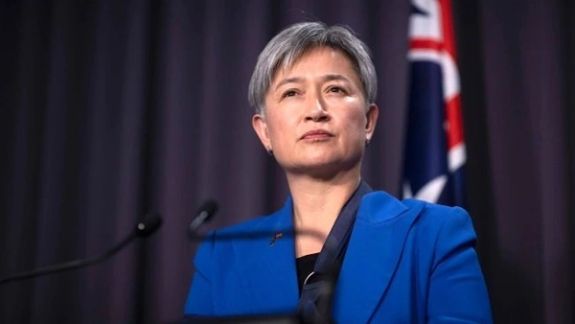
Australia’s Foreign Minister Penny Wong has condemned the regime’s human rights abuses against the people of Iran.

Australia’s Foreign Minister Penny Wong has condemned the regime’s human rights abuses against the people of Iran.
In a tweet Wednesday, she claimed she had expressed Australia's condemnation of Iran's brutal crackdown on protests, execution of protesters and oppression of women and minorities in a phone conversation with Hossein Amir-Abdollahian, her Iranian counterpart.
She also said that “she conveyed concerns over foreign interference” referring to recent reports presented in the Australian Parliament, claiming Iran’s Revolutionary Guard Corps agents targeted organizations in Australia with cyber-attacks in order to use their information for extortion.
“We will not tolerate surveillance or harassment of Iranian-Australians. We employ every strategy at our disposal - including dialogue - towards upholding human rights, consistent with our values and with our interests,” reads her tweet.
The phone conversation between Wong and Amir-Abdollahian came a few days after Canberra imposed new sanctions against Iran for violating human rights and providing Russia with drones to use in the Ukraine war.
Targeted financial sanctions and travel bans will now apply to 13 Iranian individuals and targeted financial sanctions on one entity involved in the production and supply of drones to Russia. Australia is among a growing list of foreign nations punishing members of the regime and its organizations with sanctions.
Sanctioned targets also include senior law enforcement, political and military figures, including within the Islamic Revolutionary Guard Corps, the regime's agency involved in the violent crackdown on protests following the death of Mahsa Amini and the continued oppression of the people of Iran.
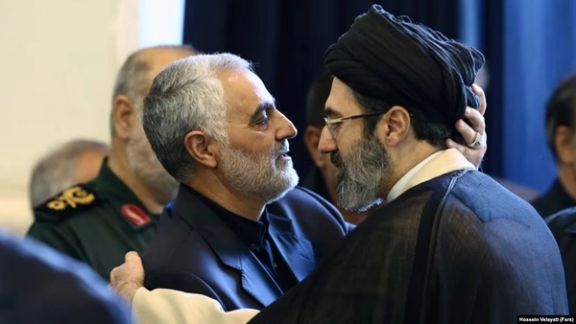
A recently-leaked document on a meeting of senior IRGC commanders and clerics with the Supreme Leader has revealed contention about the role of Khamenei’s son Mojtaba.
The 44-page minutes leaked to media last week, contains citations of remarks by 45 IRGC commanders and clerics at a meeting at Khamenei’s office on January 3 on the anniversary of the death of Quds Force commander, Qassem Soleimani, who was killed by the US three years ago.
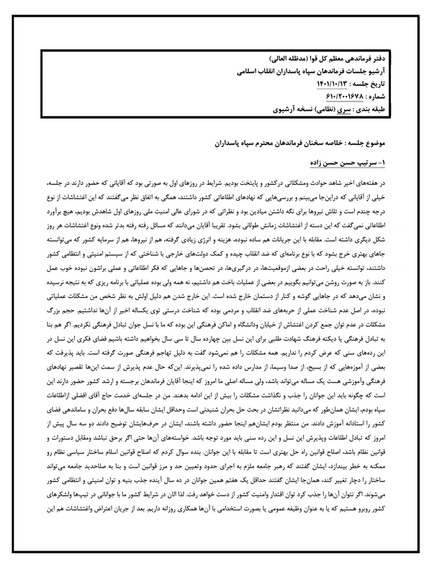
During the meeting, Yadollah Bouali, the Revolutionary Guard’s commander in the southwestern province of Fars, criticized interventions by the Mojtaba Khamenei and forces under his command, saying that such measures disrupt the security structure of the country. He added that changes at senior level positions based on the opinions of a small group can be “disastrous.”
However, several other commanders defended Mojtaba Khamenei and the role he plays in the country's security.
The IRGC commander in Kohgiluyeh and Boyer-Ahmad Province, Avaz Shahabi-Far, expressed support for Khamenei's son, alluding to a meeting attended by late Qassem Soleimani who praised him, calling him a “scholar in military science,” Shahabi-Far said, “I think that it is in the best interest of the country for him (Mojtaba Khamenei) to intervene and help in the matters he is allowed to.”
Mojtaba does not hold any official position in the country, but is said to be the de facto leader of the IRGC’s Basij paramilitary forces, who are tasked with suppressing any voice of dissent among regime forces.
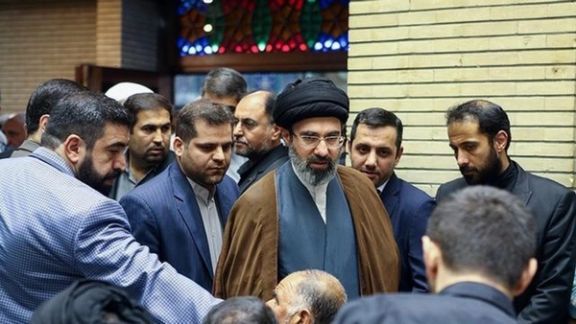
Next to speak about Mojtaba’s interventions was Mohammad-Hossein Zibayinejad, also known as Hossein Nejat, another IRGC commander who served as the deputy for its Intelligence Organization and is currently the de facto commander of the IRGC's Sarallah Base. Tasked with keeping Tehran secure, it is the most important IRGC ground force HQ in Iran consisting of several of its most important units, which protect key institutions and the offices of the government.
Defending young Khamenei's role, he said he receives reports of disobedience and selling military information on a daily basis, and added that Mojtaba can help resolve such problems. Stressing that such problems should be delegated to IRGC’s Intelligence Protection Organization, and having someone like Mojtaba at the helm can be helpful.
Although it is not officially acknowledged, Mojtaba has a significant role in assigning and removing senior officials both in IRGC’s Intelligence Organization and IRGC’s Intelligence Protection Organization, two nominally separate institutions.
Amir Ali Hajizadeh, the commander of IRGC’s Aerospace Force, also supported the Supreme Leader's son. “I personally appreciate the help of Haj Agha Mojtaba's office in overcoming the problems of the air force, both in the supply sector and also... in obtaining better results,” he said.
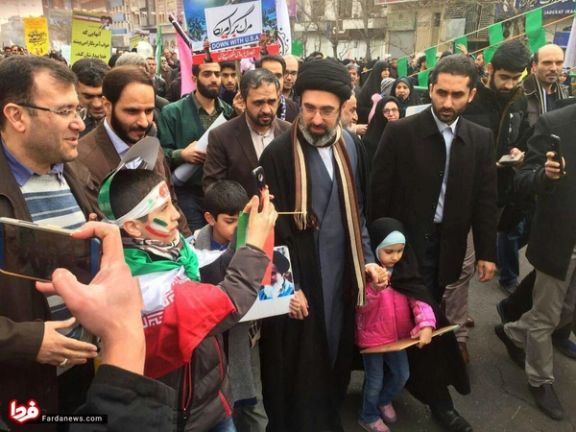
Morteza Amoumahdi, the IRGC commander in the city of Esfahan (Isfahan), came in as a supporter, saying that “the regrettable situation of the country is the result of ignorance, inefficiency and inability of (former president Hassan) Rouhani's administration, and worse than that, the result of the current administration's inefficient government.”
Amoumahdi went on to say that in a meeting with Mojtaba Khamenei where the IRGC's commanders in Sistan-Baluchestan and Khuzestan provinces were also present, “we came to the conclusion that the managers appointed by the president in executive positions have led the country to this abrupt economic failure due to their incompetence and efficiency,” tacitly saying that Mojtaba can do a better job in managing the regime’s economic and political woes.
In July 2022, an Iranian news agency’s use of the title “Ayatollah” for Mojtaba Khamenei rekindled suspicions that he is being groomed to succeed his father as the Supreme Leader. The news agency used the title in an announcement about registration at Mojtaba Khamenei’s theology course, (kharej fiqh), at Qom seminary where he has been studying and teaching for a few years now.
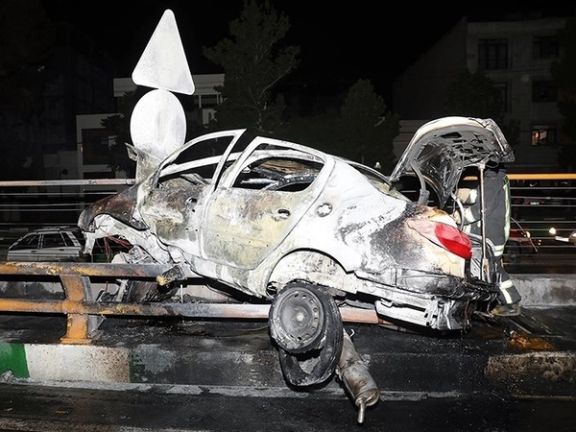
The annual Nowruz road death toll began to climb this week with at least 325 dead in the first seven days of the new year holidays.
In spite of a plan from the country’s Traffic Police to reduce deaths during the fatal season which every year sees hundreds die on the country’s roads, fatalities were soaring once more.
On Wednesday, Chief of the Traffic Police, Kamal Hadianfar, said since March 15, 7,200 people were also injured in accidents, a significant number of those left permanently disabled.
The annual phenomenon is caused by a variety of factors as the country’s 88 million population travels for the festive season.
A combination of poor roads, poor vehicle manufacturing and maintenance and dangerous driving, make it the most fatal time of year for the country’s citizens, a bitter twist to the celebrations and symbolism of hope and new life associated with new year.
On Monday, Chief of the Traffic Police Information and Control Center, Ahmad Shirani, said Khorasan Razavi, Fars, Kerman, Esfahan and Sistan and Baluchistan provinces have the highest number of fatalities.
With the holiday continuing for another 10 days, numbers are expected to continue the upward trend. Last year, 746 people were killed in road accidents during the first 18 days of Iranian new year.
Iran has one of the worst world’s statistics in terms of road accidents -- at its worst during Nowruz.
Based on official statistics, more than 33,000 Iranians died instantly in or after road accidents in 2018. Third only to heart diseases and strokes, road accidents also account for a significant share of mortalities in the country.
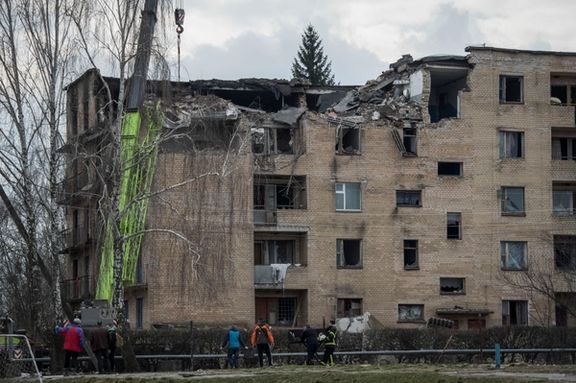
Russia launched 21 Iranian drones against civilian targets in Ukraine Wednesday, one day after China’s President Xi Jinping concluded a visit to Moscow.
At least four people were killed in the north of the country as sirens blared across the capital Kyiv and swaths of northern Ukraine overnight. The military said that it shot down 16 of the Iranian Shahed kamikaze drones but the rest got though.
Two housing blocks and an educational facility in the riverside town of Rzhyshchiv south of the capital had been partially destroyed, the State Emergency Service said on the Telegram messaging app.
"Over 20 Iranian murderous drones, plus missiles, numerous shelling incidents, and that's just in one last night of Russian terror against Ukraine," President Volodymyr Zelenskiy said on Twitter.
In an apparent reference to the Chinese leader's visit, he added: "Every time someone tries to hear the word 'peace' in Moscow, another order is given there for such criminal strikes."
Iran has supplied hundreds of killer drones to Russia since mid-2022, angering Western powers that supply air defense weapons to Ukraine to protect both military and civilian installations. Massive Russian missile and drone attacks since September aimed to destroy Ukraine’s energy infrastructure to make it hard for civilians to survive the winter.
Iran’s Supreme Leader Ali Khamenei completely denied Iran’s involvement in the war during a speech he delivered Tuesday on the occasion of the new year Nowruz.
China proposed a peace plan for Ukraine last month, which the West has largely dismissed as vague at best, and at worst a ploy to buy time for Putin to regroup his forces.
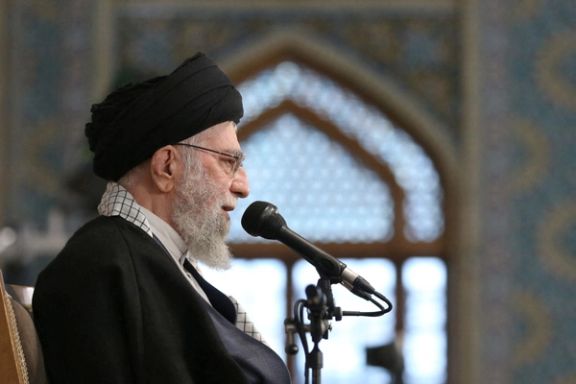
In his vitriolic new year speech, Iran’s Supreme Leader claimed the US president and European heads of state arm the country’s revolutionaries.
“During recent unrest, the US president and heads of states of certain European countries openly offered weapons and financial and security support to rioters to weaken the Islamic Republic but what happened was the opposite,” he said, in spite of the country being in its worst economic recession for decades and all but isolated on the world stage.
The allegation was one of many thrown at the West in a new year speech Tuesday, amidst outright denials of Iran’s having sent drones to Russia for use in its invasion of Ukraine. “We categorically deny any presence in the Ukraine war and such a thing is not true at all,” he said.
The remarks show little has changed in the regime rhetoric after more than six months of protests calling for an end to the Islamic dictatorship.
Khamenei, whose public speeches are always peppered with scathing criticism of the West, said not only has the ‘enemy’ fanned the flames of unrest in the country, triggered by the death in custody of Iranian-Kurd, Mahsa Amini, but claimed the West’s goal is to topple the regime and in turn, see “Islam fade into oblivion”.
It is what he terms a “hybrid war” against Iran waged by the West to undermine clerical rule, a propaganda war to “undermine the nation’s will, sow despair among the youth, and make them disappointed at the future, work, and progress by fudging the facts”.
This emphasis on such conspiracies are meant to deflect attention from the fact that Iran’s economy is in crisis and young people have lost all hope for their future, yearning for cultural and personal freedoms away from suffocating religious laws.
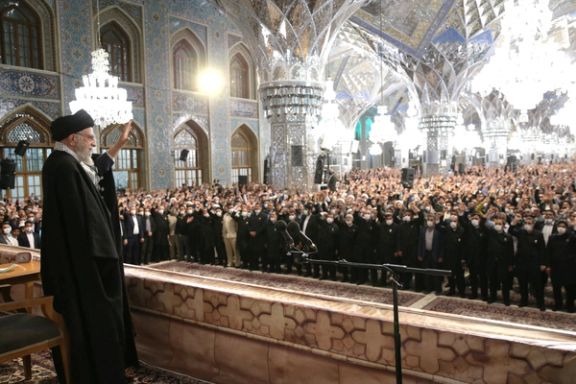
Khamenei who espouses a 20th-century leftist ideology of anti-imperialism also accused the West of having colonial designs on Iran. “In everything they do, they seek to politically and economically dominate Iran and plunder it,” he maintained.
Perhaps reflecting his deep resentment towards Saudi Arabia, which is no secret, Iran’s 83-year old authoritarian ruler failed to mention a recent agreement with the oil-rich Persian Gulf state to normalize relations, despite the fact that the deal announced earlier this month came as a diplomatic earthquake in the region and possibly the biggest diplomatic victory for Iran in years.
Removing it from isolation from one of the region’s biggest powers, the deal has brought Iran in from the cold at a time when it has become a pariah on the world stage, not least, since the collapse of nuclear talks, the JCPOA, after Iran's intransigence in negotiations.
Khamenei has long labelled the Saudi ruling elite as “corrupt” and un-Islamic, but approved restoration of ties amid its own isolation.
Recently, more and more politicians and commentators in Iran call for an opening to the world, arguing that in the 21st century no country can succeed alone. The Iranian regime’s ongoing nuclear program and its support for dangerous militant groups around the region have further isolated the country both politically and economically.
Showing no signs of weakening these proxy groups based in several countries including Lebanon and Iraq, in addition to cells far beyond the Arab world, Khamenei also reiterated support for what he calls his “axis of resistance”.
While it is hoped that the Saudi deal will mean Iran’s disarming the Houthis in Yemen, skeptics suspect the regime will not alter its policy of arming its proxies around the region. It is as yet unclear if the Houthis too, will agree to disarming.
While relations with the West continue to nosedive, Khamenei claimed that “the West’s efforts to isolate Iran have failed,” praising his policy of forging closer relations with dictatorships China and Russia, what he has dubbed as a policy of “looking East”
He had little to say on matters of economy to reassure the people that the worst recession in decades showed any sign of abating.
Economically, Iran has fallen behind even in the oil and natural gas sectors which represent its main sources of foreign currency revenues needed for economic development. Its energy sector needs upwards of $200 billion in investments, according to its own oil minister Javad Owji, in spite of the country sitting on the world’s second biggest oil fields.
In a bizarre twist, Khamenei said that Iran should even ditch the US dollar after months of sharp declines in the value of the rial, claiming that several sanctioned countries which stopped using the dollar found “their situation got better”. He failed to give examples of such wild claims.
The fate of the country remains in the hands of an aging leader with old-fashioned diplomatic and economic policies. It may be a new year for Iran, but it is still, old rhetoric which dogs its leadership.
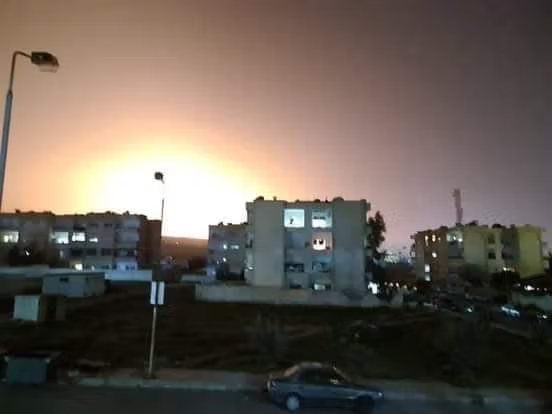
Israel hit targets near Syria's Aleppo airport Wednesday in an air strike reportedly aimed at destroying an Iranian arms depot.
The Syrian defense ministry said the air strike targeted the vicinity of Syria's Aleppo airport causing some "material damage.”
Israel has been carrying out regular attacks since 2017 against what it has described as Iran-linked targets in Syria, where Tehran's influence has grown since it began supporting President Bashar al-Assad in the civil war that started in 2011.
In the third attack on Aleppo airport in six months, Israel launched "a number of missiles from the Mediterranean Sea, west of the coastal city of Latakia, at 3:55 a.m.", the Syrian defense ministry said in a statement on state media.
Two regional intelligence sources told Reuters the strike hit an underground munitions depot linked to the nearby Nairab military airport, where missile-guided systems delivered onboard several Iranian military planes had been stored.
Iran has increased the use of Aleppo airport to deliver more arms over the past month, taking advantage of heavy air traffic as cargo planes offload relief aid in the wake of the February's deadly earthquake, Western intelligence sources say.
An Israeli strike on March 7 that knocked Aleppo airport out of service had blown up an Iranian arms cargo shipment hours after it was delivered by an Iranian plane that Damascus said was carrying aid, the Western intelligence sources say.
Israel has in recent months intensified strikes on Syrian airports and air bases to disrupt Iran's use of aerial supply lines to deliver arms to allies in Syria and Lebanon, including Lebanon's Iran-backed Hezbollah.
The strikes are part of an escalation of what has been a low-intensity conflict termed a "war between wars", the goal of which has been to slow Iran's entrenchment in Syria, Israeli military experts say.
Iran's proxy militias, led by Hezbollah, now hold sway in vast areas in eastern, southern, and northwestern Syria and in several suburbs around the capital.